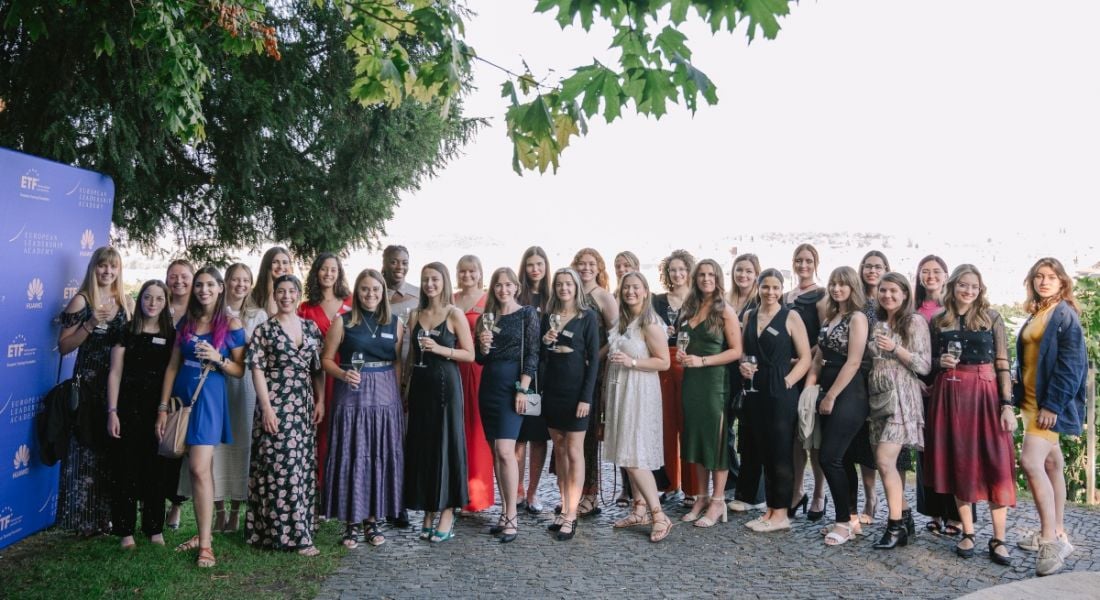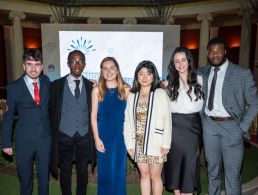As part of its European Leadership Academy, Huawei brought 29 women from all over Europe to Prague to give them a week-long summer school in tech and leadership.
Diversity and inclusion continues to be a challenge within the tech sector. While progress is happening, statistics still suggest that women only make up between 20pc and 30pc of the tech workforce.
Many companies within the industry are using different methods to try and move the needle, and Huawei’s approach is to do so through scholarships.
In 2020 Huawei Ireland announced the first of its Tech4Her scholarships, aiming to give financial support to 11 women STEM students as part of a pilot programme.
Another element of Huawei’s offering is its European Leadership Academy, which runs its free Schools for Female Leadership in the Digital Age. The most recent edition of this scholarship programme took place in Prague in July 2022.
These schools are designed to recognise and support young women from all over Europe, providing a week-long immersive education experience for students and young professionals, featuring team-building workshops, expert speakers and a variety of masterclasses.
“I call it an executive MBA for one week,” said Berta Herrero, founder and director of the Schools for Female Leadership in the Digital Age.
Herrero, who is also head of equality, diversity and inclusion for Huawei in Europe, spoke to me at the summer school’s private ‘campus’ for the week, the Martinický Palace in Prague.
“The goal is not only to provide quality education for free, the goal is also to broaden mental maps, to broaden your overview so that, as a woman, you can understand from a very young age that you can be a doctor and you can also be a cybersecurity expert, even if you have already started your career,” she said.
This year’s summer school in Prague was the programme’s third edition. Its first iteration was a summer school in Lisbon in 2021, followed by a winter school in Nice in February 2022.
Over the course of the three events, the programme has had more than 6,000 applications with less than 30 women selected for each edition.
Herrero said the programme started with the 27 EU member states in 2021, before extending to the western Balkan nations in the winter school and to Ukraine for the latest summer school.
‘Remarkable’ students from Ireland
Each candidate is chosen by a professional independent jury made up of experts from different countries. For Ireland, the juror is MEP Maria Walsh.
The profile of the jurors varies so greatly, from passions and expertise to age and gender. This, Herrero said, brings about a very diverse set students for each edition of the school.
“Sometimes you get more tech profiles, sometimes you get less,” she said. “For Ireland, we have already had three very remarkable students.”
The week culminates with an award ceremony, in which all 29 students are given their certificates.
Additionally, several recognition awards are doled out to outstanding students, with one student awarded the overall Future Leader statuette. In the past, two Irish students have received special awards for their contributions.
As I spoke to Herrero halfway through the week, she could not tell me anything about this year’s awards at the time. But she said the Irish representative in this cohort, Bukky Adebowale, was “definitely one of the most talented students” in the programme.
“She’s concerned about empowering people from diverse racial backgrounds in Ireland and enhancing this diversity in the tech sector and beyond so we are very supportive of her goals.”
This became clear when I spoke to Adebowale later that day, but also at the end of the week when she went on to win the Future Leader award.
Bukky Adebowale receiving her award. Image: European Leadership Academy
Adebowale is a 23-year-old student from Kildare who studied biological and environmental science before taking a different route into student politics for two years. Before the summer school in Prague, her most recent role was vice-president for equality and citizenship for the Union of Students Ireland.
When she spoke to me in Prague, she said getting the chance to come to the summer school was “indescribable”.
“The experience is so unique in that you’re meeting people who are like minded but at the same time so different and the experts that you’re encountering, they have so many incredible repertoires. They’re really good at what they do,” she said.
During our short chat, her passion and excitement was contagious and she said a major highlight for her was the calibre of speakers. “I’ll be walking around trying to eat lunch and I’ll just see someone who has done some incredible thing.”
Among the speakers was ImagiLabs co-founder and CEO Dora Palfi, AI expert Dr Marie Postma and Candace Johnson, founding president of Europe Online Investments.
Adebowale added that what she found really unique about the scholarship programme is how it highlights the ways in which tech ties all the students’ various backgrounds together.
“For me, it’s not so much thinking about how I can become someone who’s into tech and knows everything about coding. It’s more so about how I can take an issue, apply it into whatever I already know, which could be politics, could be science, and then finding how tech can help.”
What future applicants need to know
While tech is at the core of the Schools for Female Leadership in the Digital Age, Herrero said applicants do not have to come from a STEM background. Past participants have had experience in areas from philosophy and literature to science.
She added that scholarships like these are important because they allow “quality education to be accessible to everyone”.
“We have students coming to the school that have never travelled abroad before or even students that didn’t own a laptop,” she said.
The programme welcomes applications from students and young professionals aged 18 and over, who hold EU, Ukrainian or western Balkan citizenship or permanent residence.
‘These girls enter the school as students and they leave as leaders’
– BERTA HERRERO
“It’s a fully paid programme, meaning from the moment you leave your house to the moment you return in one week, everything will be paid for you, you don’t have to worry about anything other than learning and making a positive contribution to the group”
So, if applicants don’t need to have a background in STEM and there is no financial barrier, what do they need to show in their applications?
“Motivation. They need to show the right motivation, willingness to learn,” she said. “We do ask that they have to make a positive contribution.”
Herrero said the jury looks for well-rounded candidates from any field with a solid profile. This does not mean applicants who have already been interning at big tech companies or winning awards. It means “your thoughts are well-structured and you’re aware of your career already even if you have just left high school” and a have “clear direction of where you want to go”.
While the opportunity is incredible, Herrero said it’s also a very intensive programme. “It’s tiring, it’s exhausting, even through the course of one week because from very early morning until the evening, they are having some classes or some team-building exercises,” she said.
“These girls enter the school as students and they leave as leaders.”
Herrero’s sentiment is clear from what I saw during my trip to Prague. All participants were engaged, intelligent, forthcoming with ideas and full of intelligent questions and discussions.
And from speaking directly to Ireland’s own Adebowale, the effect of the programme is clear. Having come in wanting to find a way to give equal access to opportunities for people of colour and women, she was already even more inspired.
“Now it’s challenging me to think, ‘What can I do that’s bigger?’ I feel like that’s big but not big enough.”
10 things you need to know direct to your inbox every weekday. Sign up for the Daily Brief, Silicon Republic’s digest of essential sci-tech news.




